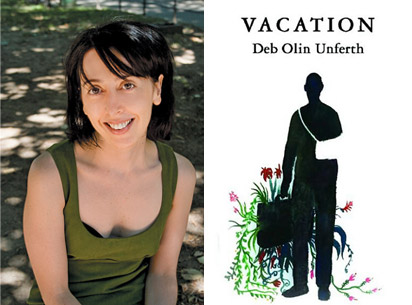Good Evening,
Tonight I give my thoughts on the First Novelist Award winner Deb Olin Unferth's breakout novel, Vacation. I'll try to avoid spoiling any important details that may disincline you from reading the novel. I think it's good, and if you're into her style, which is quirky and witty, you or maybe someone you know will get a kick out of this story. I was fortunate enough to catch a reading and panel with Unferth, her agent, and editor at McSweeney's, Eli Horowitz. It was a very interesting experience. Her reading of Chapter 5 inspired me to buy the book, and Horowitz had a lot of cool info about the publishing industry. Unferth's journey from draft to print is a funny one too. She spent three years writing a novel. It sucked and she threw it away. That's when she wrote Vacation.
I was fortunate enough to catch a reading and panel with Unferth, her agent, and editor at McSweeney's, Eli Horowitz. It was a very interesting experience. Her reading of Chapter 5 inspired me to buy the book, and Horowitz had a lot of cool info about the publishing industry. Unferth's journey from draft to print is a funny one too. She spent three years writing a novel. It sucked and she threw it away. That's when she wrote Vacation.
The premise of Vacation is simple enough. An average man named Myers tries to find an old acquaintance named Gray. While the first leg of the trip is easy, a mere flight from New York to Syracuse, the rest of the trip takes Myers to some pretty unexpected places. The bulk of the book is written in the third person, with occasional what you may call confessionals with particular characters.
Unferth's voice is very fun. Short sentences and well timed repetition and lists give the novel a rhythm that is quite pleasing. I equate the narration to the feeling one may get while watching a Wes Anderson movie. No soundtrack is necessary, but a well selected song or two could give the book a great tone.
Tone is important here. Despite the rather dire nature and unfortunate circumstances Myers encounters, there is an ironic humor throughout that keeps the reader entertained. It's pretty refreshing if you've been reading nothing but heavy dramatic novels or non-fiction for awhile.
Unferth's use of dialogue is sparse and deliberate. In fact, there are no quotation marks, which I'll admit took me a while to get used to, since I'm not big into novelists who use that approach, but by doing so, the dialogue of each character is kept short and it forces the reader to pay close attention. Well used technique.
The plot is a little disjointed, which kind of threw me for a while, but Unferth relies on the mystery of the relationship between Myers, Gray and Myers' wife to keep the reader engaged. By the end of the novel, it's understood why the book is written that way, and it certainly is controlled, with the story broken up more frequently at the end of the novel than at the beginning. For the first half, scenes are complete, flashbacks and confessionals are used as breaks between scenes, but by the end, scenes are interrupted. By this time however, you should be so invested in the novel that reading a brief flashback and finding out how the scene ends is a major priority. Unferth does this well for the most part, but some of the interruptions are ill-timed in my opinion, and some of the plot elements that are important at the end of the novel are introduced a little bit too late for my taste.
The novel explores the relationships of Gray, Myers, and their marriages. It's pretty insightful in that regard as well. Unferth does a great job describing feelings and sensations. She expresses curiosity for the reasoning behind people's least reasonable actions. It's a good look into some of the more awkward elements of human nature.
All in all, I enjoyed this book despite any faults I may have found with it. It's a witty, light novel with and lot of meaningful subject matter. I couldn't read a book like this every week, but I could definitely use a book like this every now and again when other books start seeming melodramatic.
I hope you check it out. You won't regret it.
-Steve
Sometimes pretentious yet mostly brilliant. Mostly.
Friday, December 11, 2009
Vacation
Posted by
Steve Lynn B.
at
8:11 PM
![]()
Subscribe to:
Post Comments (Atom)


No comments:
Post a Comment